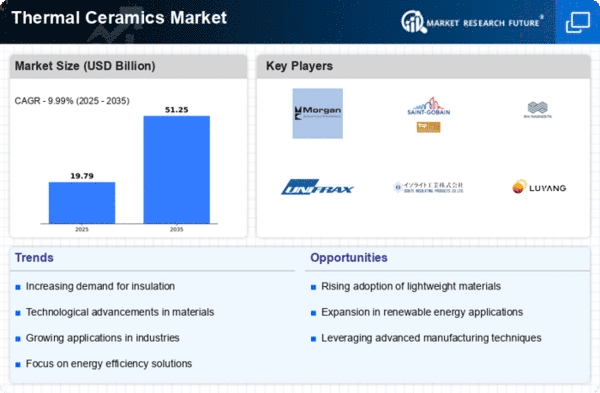Top Industry Leaders in the Thermal Ceramics Market

These high-performance materials, defying the scorching flames and chilling ice, are the backbone of various industries, from aerospace and power generation to metallurgy and semiconductors. But navigating this molten landscape requires a heat-resistant lens to discern the strategies, players, and recent developments shaping the market.
Market Titans and their Fireproof Playbooks:
Several established stalwarts like Saint-Gobain, Morgan Advanced Materials, Kyocera Corporation, Imerys, and HarbisonWalker International vie for the top spot, each employing unique strategies to withstand the competitive heat:
-
Product Portfolio Diversification: Beyond traditional materials like refractory bricks and alumina crucibles, companies are exploring advanced ceramics like zirconia, silicon nitride, and boron nitride for specialized applications. Saint-Gobain, for example, boasts a diverse portfolio catering to high-temperature furnaces, aerospace components, and energy-efficient insulation. -
Geographic Expansion: Emerging economies in Asia-Pacific, particularly China and India, present immense growth potential. Established players are setting up manufacturing facilities and distribution channels in these regions to capitalize on this burgeoning demand. Morgan Advanced Materials has a strong presence in China and Southeast Asia. -
Technological Innovation: Continuous R&D efforts focus on developing novel ceramic materials with enhanced thermal conductivity, electrical insulation, and mechanical strength. This includes exploring nano-engineering and advanced manufacturing techniques. Kyocera Corporation has pioneered developments in biocompatible ceramics for medical implants and high-performance electronics. -
Sustainability Focus: Environmental concerns are driving the development of eco-friendly ceramics made from recycled materials or with reduced energy consumption during production. Imerys prioritizes sustainable practices throughout its ceramic materials value chain. -
Strategic Partnerships and Acquisitions: Collaborations with research institutions, universities, and downstream companies foster innovation and facilitate access to new technologies and markets. Acquisitions of smaller companies with specialized expertise also help consolidate market share. HarbisonWalker International recently acquired a leading manufacturer of advanced refractory lining solutions for the steel industry.
Factors Determining Market Share: Beyond the Heatwaves:
Beyond brand recognition, several factors determine a company's success in the thermal ceramics materials market:
-
Material Performance: Superior thermal resistance, strength, durability, and chemical resistance are crucial for customer satisfaction and brand loyalty. -
Application Specificity: Offering specialized ceramics tailored to specific industries like steelmaking, chemical processing, and power generation is essential. -
Cost-Effectiveness and Scalability: Competitive pricing and the ability to scale up production for large-scale projects are key to market penetration. -
Technical Expertise and Support: Providing comprehensive technical guidance and application know-how helps customers choose the right ceramic material solution for their specific needs. -
Compliance with Regulations: Navigating the complex web of regulations governing safety, environmental impact, and use of specific materials in various industries is crucial for market compliance.
Key Players:
- CeramTec
- Dyson Technical Ceramics, FibreCast Inc.
- Ibiden Co., Ltd.
- Isolite Insulating Products Co., Ltd.
- Mitsubishi Chemical Corporation
- Morgan Advanced Materials
- RHI Magnesita
- 3M Company
- Unifrax
Recent Developments in the Molten Core:
November 2023: Kyocera Corporation partners with a tech startup to develop next-generation solid-state batteries using advanced ceramics, promising faster charging and longer lifespan.
October 2023: Imerys successfully scales up production of its bio-derived ceramic fibers for high-temperature insulation applications, offering a sustainable alternative to traditional materials.
September 2023: A consortium of major thermal ceramics manufacturers launches a research project to explore the potential of using 3D printing technology for customized ceramic component production.
August 2023: HarbisonWalker International unveils a novel high-strength refractory brick for lining steelmaking furnaces, enabling higher operating temperatures and improved efficiency.










